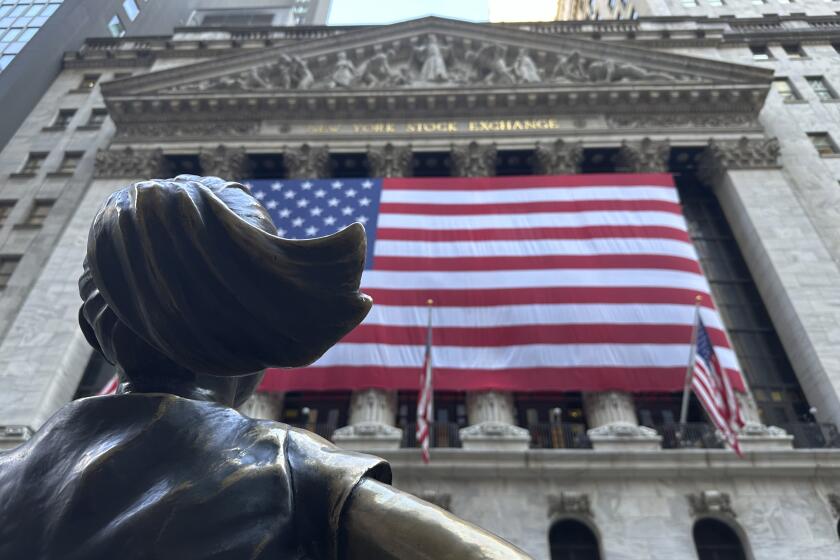Grocers, Lockyer in Late Talks Over Mutual-Aid Probe
The three chains in the supermarket dispute held last-minute talks Monday with the state attorney general over his demand that they surrender a copy of their controversial mutual-aid pact.
Atty. Gen. Bill Lockyer, citing potential antitrust violations, subpoenaed Safeway Inc., Kroger Co. and Albertsons Inc. on Dec. 1, asking them to produce the agreement by the close of business Monday.
Lockyer spokesman Nathan Barankin declined to comment on whether the stores had complied but said discussions continued between Lockyer’s office and the chains late Monday. “We expect to have things resolved” by today, he said.
A spokeswoman for Safeway, which owns Vons and Pavilions, confirmed there were talks with Lockyer’s office but declined to elaborate.
Negotiations between the chains and the United Food and Commercial Workers union collapsed Friday after the stores rejected a contract offer from the UFCW. The proposal “fell far short,” the chains said in a joint statement.
The strike and lockout, now in its third month, yielded these other developments Monday:
* The UFCW pulled its pickets from warehouses for Albertsons and Kroger’s Ralphs chain as planned, but in a surprise move the union kept picket lines active at Vons and Pavilions distribution centers. The Teamsters union said it would continue to honor those picket lines.
* Union officials said they believed they were close to completing deals with medical providers to retain coverage for grocery workers and their dependents when employer-paid health benefits expire Dec. 31.
* Another union said it was seeking to replace the UFCW as the bargaining agent for 800 or so pharmacists who work for the grocery chains in the region. The Guild for Professional Pharmacists, based in Woodland Hills, said it had signatures of about 240 pharmacists who wished to exit the UFCW.
The three supermarket companies are bargaining jointly with the UFCW and, in a sign of solidarity, entered a mutual-aid pact that effectively calls for Kroger to share the windfall that its Ralphs stores have received since Oct. 31. That’s when the UFCW removed its pickets from Ralphs stores to focus pressure on the two other companies.
The stores have defended the accord as legal but have disclosed few details about it. Kroger has said the payments would follow a formula based on the three chains’ recent sales as compared with their historical sales. Kroger and Albertsons also have said no money would change hands until the dispute ends.
None of the chains so far has broken out the dollar amount of what those payments might be.
For his part, Lockyer has said the sharing of money between three publicly held competitors raised questions. He said his probe would “seek to determine whether the stores on the other side are playing fair” within state and federal laws.
The dispute began Oct. 11 when the UFCW struck Safeway. That prompted Albertsons and Ralphs to lock out their union workers. About 70,000 workers in all are idled at 852 supermarkets in Southern and Central California.
The dispute focuses on the supermarkets’ effort to win lower employee wage and benefits costs, which the chains say they need to better compete with discount mass merchandisers such as Wal-Mart Stores Inc. that are aggressively expanding in the grocery business.
On Friday, the UFCW said it would stop picketing the Teamsters-staffed warehouses of all three companies, partly as a good-faith gesture for the contract talks. Privately, union officials said that the Teamsters were eager to return to the job and that their support of the UFCW lost effectiveness as the stores hired replacement workers.
As federally mediated talks resumed Friday, the grocery chains rejected a new contract proposal from the UFCW, and negotiations collapsed that night. No new talks are expected until after Jan. 1.
On Monday, the UFCW did remove its picket lines from Albertsons and Ralphs distribution centers but left them at the region’s four Vons and Pavilions warehouses. The UFCW said it singled out Safeway, based in Pleasanton, Calif., because in its view the chain had taken the harshest stance in the dispute.
“We’re targeting Safeway because they’ve been very vocal in spearheading all the events ... forcing this strike,” said Ellen Anreder, a spokeswoman for six of the seven UFCW locals involved in the dispute.
Safeway spokesman Brian Dowling said the company was not surprised by the action because “we’ve been the struck company. But it won’t make a difference. We are prepared to deal with it, and we’ll keep our stores supplied.”
The removal of the warehouse picket lines allows about 6,000 Teamsters to return to work. About 2,000 other Teamsters who work at and drive trucks to Vons and Pavilions warehouses will remain idled, said Jim Santangelo, president of Teamsters Joint Council 42.
“I told my guys ... ‘As long as those lines are up, you will not cross,’ and they have no problem with that,” Santangelo said.
Union officials also were working Monday to extend medical benefits, which are scheduled to expire Dec. 31 for most workers.
“We believe that our ... providers are going to carry us for a few months so those members can keep their coverage,” said Greg Conger, president of UFCW Local 324 in Orange County and a trustee of the workers’ health-care fund.
Representatives of two of the providers, Kaiser Permanente and PacifiCare Health Systems Inc., could not be reached for comment.
Separately, the Guild for Professional Pharmacists said it filed a petition with the National Labor Relations Board seeking an election that would let the union represent the grocery stores’ pharmacists.
Guild President Ralph Vogel said pharmacists were “getting nowhere fast” with the UFCW, which he said was more concerned with the needs of grocery clerks who make up the bulk of its membership. The UFCW’s Anreder declined to comment on the guild’s effort.
--- UNPUBLISHED NOTE ---
On February 12, 2004 the United Food and Commercial Workers Union, which had stated repeatedly that 70,000 workers were involved in the supermarket labor dispute in Central and Southern California, said that the number of people on strike or locked out was actually 59,000. A union spokeswoman, Barbara Maynard, said that 70,000 UFCW members were, in fact, covered by the labor contract with supermarkets that expired last year. But 11,000 of them worked for Stater Bros. Holdings Inc., Arden Group Inc.’s Gelson’s and other regional grocery companies and were still on the job. (See: “UFCW Revises Number of Workers in Labor Dispute,” Los Angeles Times, February 13, 2004, Business C-11)
--- END NOTE ---
More to Read
Inside the business of entertainment
The Wide Shot brings you news, analysis and insights on everything from streaming wars to production — and what it all means for the future.
You may occasionally receive promotional content from the Los Angeles Times.







